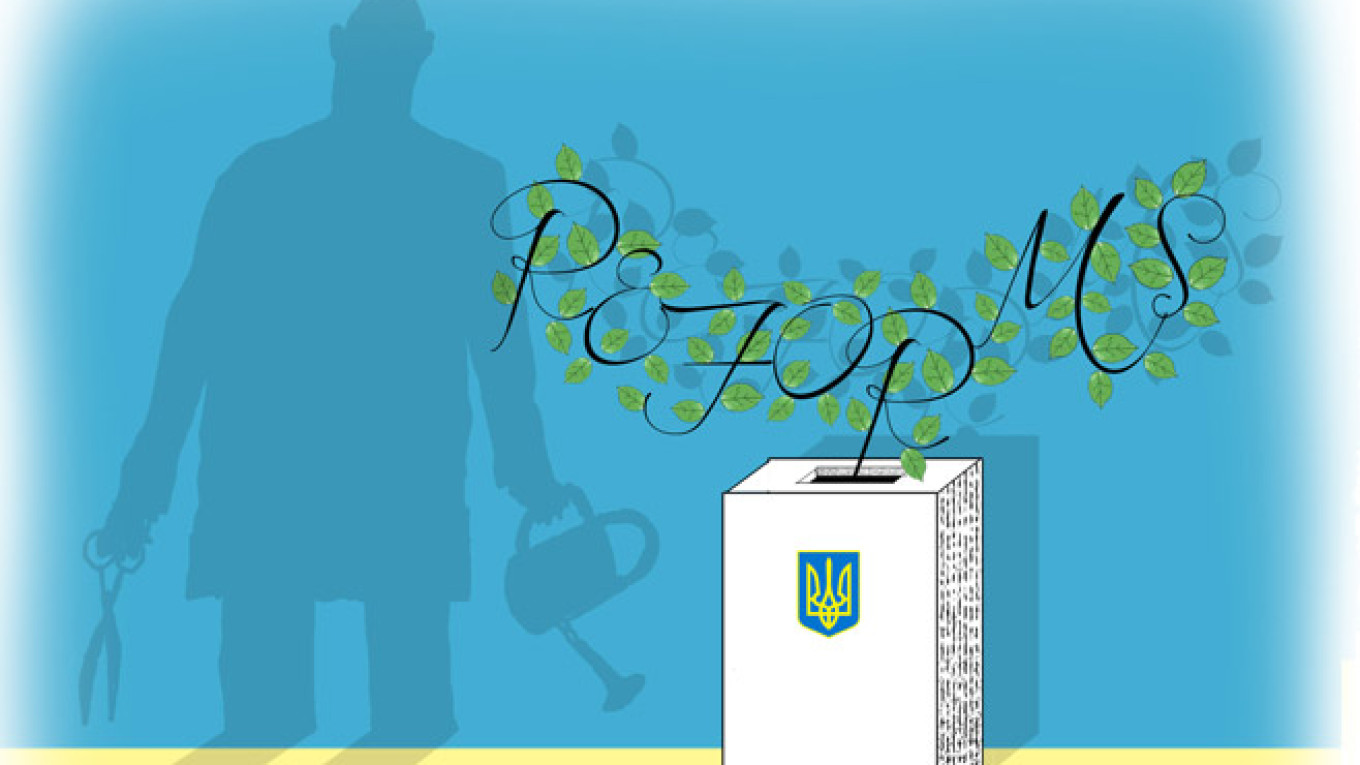Will the Ukrainian parliamentary elections held last Sunday help the country reduce the pervasive corruption that blocks sustainable economic growth and makes Ukraine vulnerable to pressure from its predatory neighbor?
We will probably know the answer within a few weeks because only quick and decisive action taken immediately after the electoral cycle has concluded will be effective.
Many of the demonstrators who took part in the so-called Euromaidan protests in Kiev were thinking of Poland when they hit the streets earlier this year. Although Ukraine and Poland were essentially in the same place in 1990, Poland's ability to execute quick but painful reforms paid off. Now Poland's average income is three times higher than Ukraine's, and the economy continues to perform well.
Ukraine's elections provide a good start in the fight against entrenched bureaucrats who favor the status quo. The parliament now has a pro-reform majority. While there may be disputes over specific issues, the overall direction of reforms is clear. Ukraine's leadership must implement a package of reforms across the board and hope that the benefits of their effort start to bear fruit before the next cycle of elections begins.
Ukraine also benefits from external pressure for reform. The pressing comes in a negative sense from Russia, which is occupying Ukrainian territory, and in a positive sense from the EU, whose association agreement provides some of the benefits of union membership. This external pressure is necessary to build a coalition among the new parliamentary parties to push ahead with reform.
The new parliament must exercise a political will that has not been present in the leadership of the post-Euromaidan government so far. Leaders affiliated with the protests have already resigned from the government, declaring that they lacked the tools to move ahead. The purpose of the elections was to give reformers what they needed to encourage change.
Reforms will have to be all-encompassing and will put a strain on the many new members of parliament who have no experience working as lawmakers. Hopefully they will have the wisdom and energy to succeed.
Reforms should start in the economic sphere and should be aimed at reducing Ukraine's dependence on the oligarchic system that began to emerge in the ashes of the Soviet Union. It is crucial to put in place the kinds of regulations that would stimulate massive growth in small business since these new enterprises will provide jobs.
Effective businesses will need independent courts to resolve the inevitable conflicts that arise. Creating such courts will require legislation that reduces the power of court chairmen, who have in the past translated requests from politicians into court outcomes.
Another area for reform is the media. Already there are some reports of creeping self-censorship about criticizing Ukrainian President Petro Poroshenko. It would send an appropriate signal if the president followed up on the OSCE recommendation to sell his own television network, which had a solid reputation for critical reporting under previous leaders.
Several of the country's top journalists ran for parliament on the president's list. It is undoubtedly good news that committed individuals are entering politics and trying to change the system from the inside.
But it is necessary to ensure that there is a bright line between media coverage of what is going on and the politicians themselves. Hopefully the new members of parliament will promote the same kind of transparency they advocated in their roles as journalists.
Similarly important is for the new parliament to continue to engage civil society groups that work to hold officials accountable to popular demands. Part of the reason civil society is weak in Russia is because nobody in the administration is interested in the input of such groups. The new parliament in Ukraine should find ways to engage the activism of the Euromaidan movement, which is strongly interested in pushing the reform process forward.
Ukraine has made great progress by holding early elections in an effort to make a clean break with the past and build a new economic and political system. The elections did not remove all elements of the old regime, and there are new parties whose primary interest is promoting nationalism rather than reform. But there are enough parties backing reform to start making progress. The trick will be to not succumb to the naysayers who argue that any kind of change is impossible or will only make the situation worse.
Ukraine is already a radically different country than it was a year ago. But it will have to keep reforming if it wants to escape the domestic problems that undermine stability and the predations of its powerful neighbor.
Robert Orttung is assistant director of the Institute for European, Russian and Eurasian Studies at the George Washington University's Elliott School of International Affairs.
A Message from The Moscow Times:
Dear readers,
We are facing unprecedented challenges. Russia's Prosecutor General's Office has designated The Moscow Times as an "undesirable" organization, criminalizing our work and putting our staff at risk of prosecution. This follows our earlier unjust labeling as a "foreign agent."
These actions are direct attempts to silence independent journalism in Russia. The authorities claim our work "discredits the decisions of the Russian leadership." We see things differently: we strive to provide accurate, unbiased reporting on Russia.
We, the journalists of The Moscow Times, refuse to be silenced. But to continue our work, we need your help.
Your support, no matter how small, makes a world of difference. If you can, please support us monthly starting from just $2. It's quick to set up, and every contribution makes a significant impact.
By supporting The Moscow Times, you're defending open, independent journalism in the face of repression. Thank you for standing with us.
Remind me later.


